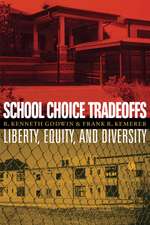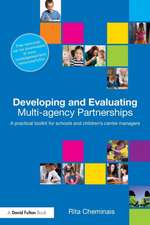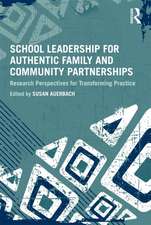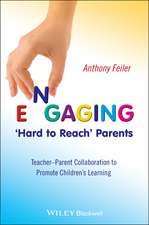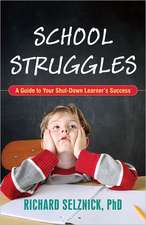Family Factors and the Educational Success of Children
Editat de William Jeynesen Limba Engleză Hardback – 2 sep 2009
| Toate formatele și edițiile | Preț | Express |
|---|---|---|
| Paperback (1) | 291.75 lei 6-8 săpt. | |
| Taylor & Francis – 27 aug 2009 | 291.75 lei 6-8 săpt. | |
| Hardback (1) | 681.08 lei 6-8 săpt. | |
| Taylor & Francis Ltd (Sales) – 2 sep 2009 | 681.08 lei 6-8 săpt. |
Preț: 681.08 lei
Preț vechi: 801.28 lei
-15% Nou
Puncte Express: 1022
Preț estimativ în valută:
130.32€ • 136.07$ • 107.86£
130.32€ • 136.07$ • 107.86£
Carte tipărită la comandă
Livrare economică 05-19 aprilie
Preluare comenzi: 021 569.72.76
Specificații
ISBN-13: 9780789037619
ISBN-10: 0789037610
Pagini: 420
Ilustrații: Illustrations
Dimensiuni: 156 x 234 x 24 mm
Greutate: 0.76 kg
Ediția:1
Editura: Taylor & Francis Ltd (Sales)
ISBN-10: 0789037610
Pagini: 420
Ilustrații: Illustrations
Dimensiuni: 156 x 234 x 24 mm
Greutate: 0.76 kg
Ediția:1
Editura: Taylor & Francis Ltd (Sales)
Cuprins
1. Introduction: The Salience of Family Factors in Children’s School Experiences William Jeynes
Summaries of the Effects of Parental Style and Parental Involvement
2. Parenting Styles: The impact on student achievement Lola Brown and Shrinidhi Iyengar
3. Families, their children’s education, and the public school: An historical review Diana Hiatt-Michael
4. Father Involvement and Children’s Early Learning: A Critical Review of Published Empirical Work from the Past 15 Years Jason Downer, Rodrigo Campos, Christine McWayne, and Tara Gartner
Parental Involvement and the Academic Achievement of Hispanic Students
5. Community Literacy Resources and Home Literacy practices among Immigrant Latino Families Leslie Reese and Claude Goldenberg
6. Examining Famial-Based Academic Success Factors in Urban High School Students: The Case of Puerto Rican Female High Achievers Rene Antrop-Gonzalez, William Velez, and Tomas Garrett
7. Expectations, Aspirations, and Achievement among Latino Students of Immigrant Families Dick M. Carpenter II
Education & Religion as a means of improving family life
8. Family, denomination and the adolescent worldview: an empirical enquiry among 13- to 15-year-old females in England and Wales Leslie J. Francis
9. The Influence of Religion on Latino Education, Marriage, and Social Views in the United States Gastòn Espinosa
Parental Involvement as a Means of Improving the Quality of Life
10. Increased Family Involvement in School Predicts Improved Child-Teacher Relationships and Feelings about School for Low-income Children Eric Dearing, Holly Kreider, and Heather B. Weiss
11. Effects Of Parental Involvement On Experiences of Discrimination And Bullying William H. Jeynes
Improving Parental Involvement & Building Partnerships
12. How Parents and Teachers View their School Communities Sam Redding
13. Altering the Curriculum of the Home: Learning Environments for Korean and U.S. Students Susan J. Paik
14. Caregiver Engagement in Religious Urban Elementary Schools Martin Scanlan
15. High School Family Centers: Transformative Spaces Linking Schools and Families in Support of Student Learning Karen L. Mapp, Vivian R. Johnson, Carol Sills Strickland, and Catherine Meza
16. Families Home Schooling in a Virtual Charter School System Carol Klein and Mary Poplin
Summaries of the Effects of Parental Style and Parental Involvement
2. Parenting Styles: The impact on student achievement Lola Brown and Shrinidhi Iyengar
3. Families, their children’s education, and the public school: An historical review Diana Hiatt-Michael
4. Father Involvement and Children’s Early Learning: A Critical Review of Published Empirical Work from the Past 15 Years Jason Downer, Rodrigo Campos, Christine McWayne, and Tara Gartner
Parental Involvement and the Academic Achievement of Hispanic Students
5. Community Literacy Resources and Home Literacy practices among Immigrant Latino Families Leslie Reese and Claude Goldenberg
6. Examining Famial-Based Academic Success Factors in Urban High School Students: The Case of Puerto Rican Female High Achievers Rene Antrop-Gonzalez, William Velez, and Tomas Garrett
7. Expectations, Aspirations, and Achievement among Latino Students of Immigrant Families Dick M. Carpenter II
Education & Religion as a means of improving family life
8. Family, denomination and the adolescent worldview: an empirical enquiry among 13- to 15-year-old females in England and Wales Leslie J. Francis
9. The Influence of Religion on Latino Education, Marriage, and Social Views in the United States Gastòn Espinosa
Parental Involvement as a Means of Improving the Quality of Life
10. Increased Family Involvement in School Predicts Improved Child-Teacher Relationships and Feelings about School for Low-income Children Eric Dearing, Holly Kreider, and Heather B. Weiss
11. Effects Of Parental Involvement On Experiences of Discrimination And Bullying William H. Jeynes
Improving Parental Involvement & Building Partnerships
12. How Parents and Teachers View their School Communities Sam Redding
13. Altering the Curriculum of the Home: Learning Environments for Korean and U.S. Students Susan J. Paik
14. Caregiver Engagement in Religious Urban Elementary Schools Martin Scanlan
15. High School Family Centers: Transformative Spaces Linking Schools and Families in Support of Student Learning Karen L. Mapp, Vivian R. Johnson, Carol Sills Strickland, and Catherine Meza
16. Families Home Schooling in a Virtual Charter School System Carol Klein and Mary Poplin
Recenzii
This insightful collection of essays provides a nuanced and sophisticated look into the ways the family furthers academic achievement and other beneficial student behavior. The findings will help educators, policy makers and parents more clearly to understand how healthy family dynamics contribute to the school experiences of youth. The examples and thoughtful reflections will help them envision how schools can partner with families to improve these vital relationships.
Perry L. Glanzer, Ph.D., Associate Professor, Baylor University
This book successfully pulls together cutting-edge research from a variety of disciplines and types of inquiry and provides an important history and overview of the subject. It also draws attention to the role of religious belief in educational success. In this accountability-driven era, when people search for nearly any solution to increase the success of students, it is good to have the idea of parental involvement aired out for investigation. Educational researchers, school administrators and teachers, policymakers, and parents will benefit from reading this work and applying its principles to their own work with children.
Joanne Marshall, Associate Professor of Education, Iowa State University
Perry L. Glanzer, Ph.D., Associate Professor, Baylor University
This book successfully pulls together cutting-edge research from a variety of disciplines and types of inquiry and provides an important history and overview of the subject. It also draws attention to the role of religious belief in educational success. In this accountability-driven era, when people search for nearly any solution to increase the success of students, it is good to have the idea of parental involvement aired out for investigation. Educational researchers, school administrators and teachers, policymakers, and parents will benefit from reading this work and applying its principles to their own work with children.
Joanne Marshall, Associate Professor of Education, Iowa State University


